
35 minute read
ARTICLE
PREAMBLE AGREEMENT between HOFSTRA UNIVERSITY and THE HOFSTRA CHAPTER OF THE AMERICAN ASSOCIATION OF UNIVERSITY PROFESSORS
The purpose of this Agreement is to provide the faculty and administration of Hofstra University with a contract which will insure a healthy and viable institution of higher learning, research, and public service. This Agreement aims at maintaining educational excellence, facilitating effective faculty participation in decisions affecting the welfare of the University, assuring fair and reasonable conditions of employment and providing techniques and procedures for the peaceful adjustment of disputes, should these arise.
Advertisement
To this end the faculty and administration have, through their representatives, negotiated this Agreement as follows:
ARTICLE 1: LIST OF DEFINITIONS
1.1 Administration. The Board of Trustees of Hofstra University, a private institution of higher education chartered by the Board of Regents of the State of New York, and such administrative officers as may be appointed by the Board of Trustees.
1.3 Faculty Member. For purposes of this Agreement, a member of the bargaining unit, as defined in Article 2.2 of this Agreement.
1.4 Regular Adjunct Faculty Member. A part-time member of the bargaining unit, as defined in Article 2.2 of this Agreement.
Page 1
1.5 Bargaining Unit. Unit of employees as described in Article 2.2 of this Agreement.
1.6 Academic Unit. The academic units of the University included in the bargaining unit are the Schools identified in Article 1.11 below.
1.8 College or Division Faculty Personnel Board (FPB). As defined in Article 5 of this Agreement.
1.9 University Appeals Board (UAB). As defined in Article 5 of this Agreement.
1.11 School. When the term "School" is used in this Agreement, the following Schools are included:
Hofstra College of Liberal Arts and Sciences, including four (4) schools:
School of Humanities, Fine and Performing Arts School of Natural Sciences and Mathematics Peter S. Kalikow School of Government, Public Policy and International Affairs School of Education
Frank G. Zarb School of Business Hofstra Northwell School of Nursing and Physician Assistant Studies Honors College Lawrence Herbert School of Communication Fred DeMatteis School of Engineering and Applied Science School of Health Professions and Human Services
References to Schools shall also include the Library, unless the context provides otherwise.
Page 2
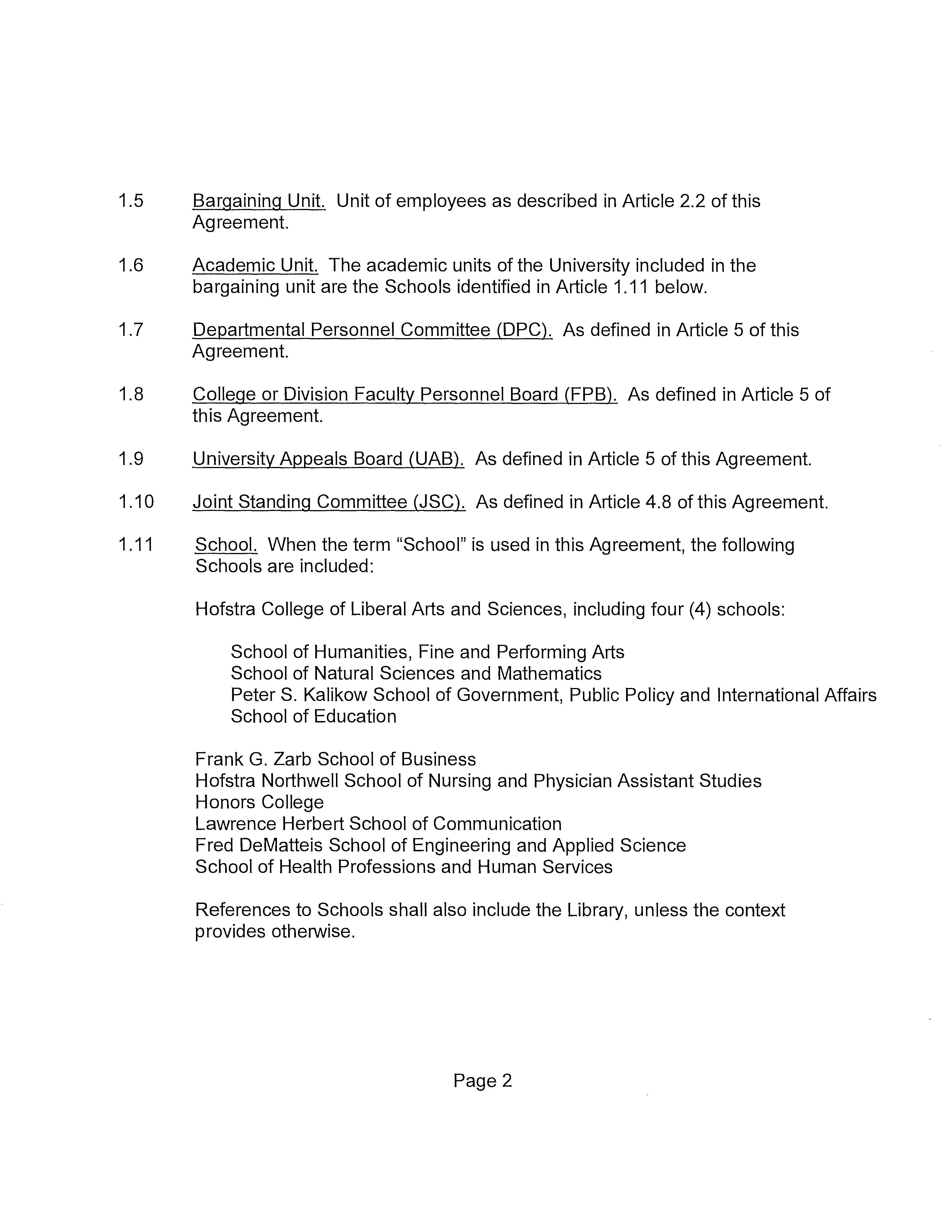
ARTICLE 2: RECOGNITION OF THE AAUP
2.1 Role of AAUP. The Administration hereby recognizes the AAUP as sole and exclusive bargaining agent for the faculty and professional faculty librarians (as defined below).
2.2 Groups in Bargaining Unit. Included in the bargaining unit are all full-time faculty, those holding special status, those holding the title of assistant or associate chair, all regular adjunct faculty and all full-time and part-time faculty librarians. Adjunct faculty become members of the bargaining unit, i.e., achieve "regular" status, after teaching nine (9) credit hours, over at least three (3) semesters within four (4) academic years.
2.3 Groups Excluded from Bargaining Unit. Excluded from the bargaining unit are: academic deans of all ranks; teaching deans; all department chairpersons or department heads; faculty holding visiting rank; speech clinicians; part-time faculty who do not meet the requirements of Article 2.2 above; military personnel serving in the Department of Military Science; all faculty members and professional staff, including librarians and clinicians, in the Law School and Medical School; all other administrative personnel of the University, all non-professional employees, and all other employees of the University not covered under Article 2.2 of this Agreement.
2.4 Eligibility to Represent Faculty. No person excluded from the bargaining unit as set forth in Article 2.3 shall represent the faculty on the University Senate or any of its committees, except that there may be one representative each from the Medical School and the Law School faculty.
Page 3
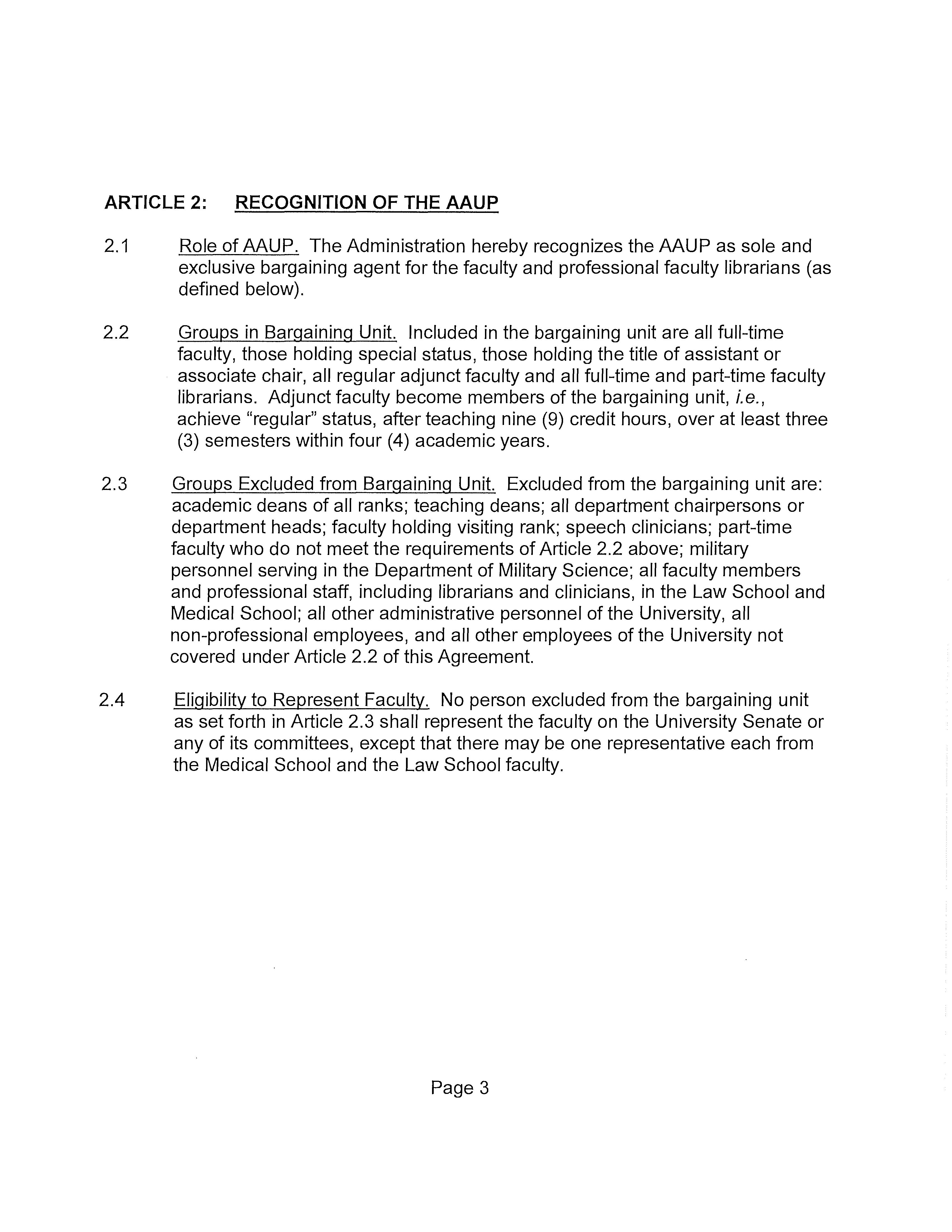
ARTICLE 3: FACULTY STATUTES AND FACULTY POLICY SERIES
3.1 Role of FS and FPS. The parties hereby acknowledge that the Faculty Statutes (hereinafter "FS") and the Faculty Policy Series (hereinafter "FPS") constitute the fundamental documents which govern the rights and responsibilities of the Faculty of Hofstra University, subject to the provisions of this Agreement.
3.2 Parties Bound by FS and FPS. The provisions of the FS and FPS are binding upon the parties unless modified by or in conflict with this Agreement, in which case this Agreement will control, and the FS and FPS are hereby incorporated by reference into this Agreement.
3.3 Amendments to FS or FPS. During the term of this Agreement, no amendments to the FS or FPS or any University practice which would void, alter or in any way modify any provision of this Agreement will be enacted or effectuated without the consent of the AAUP.
3.4 Process for Amending FS or FPS. Any and all proposed amendments to the FS or FPS duly passed by the University Senate and Faculty or Faculty alone will be submitted to the President who will reply in writing or submit same to the Board of Trustees, which in turn will reply in writing (and where the reply is negative, will state its reasons therefor) within five weeks after the next meeting of the Board of Trustees, but in no event more than ninety (90) days after submission to the President.
3.5 Reservation of Management Rights. Management rights and functions, except those which are abridged by this Agreement, will remain vested in the Administration, except as provided in this Agreement.
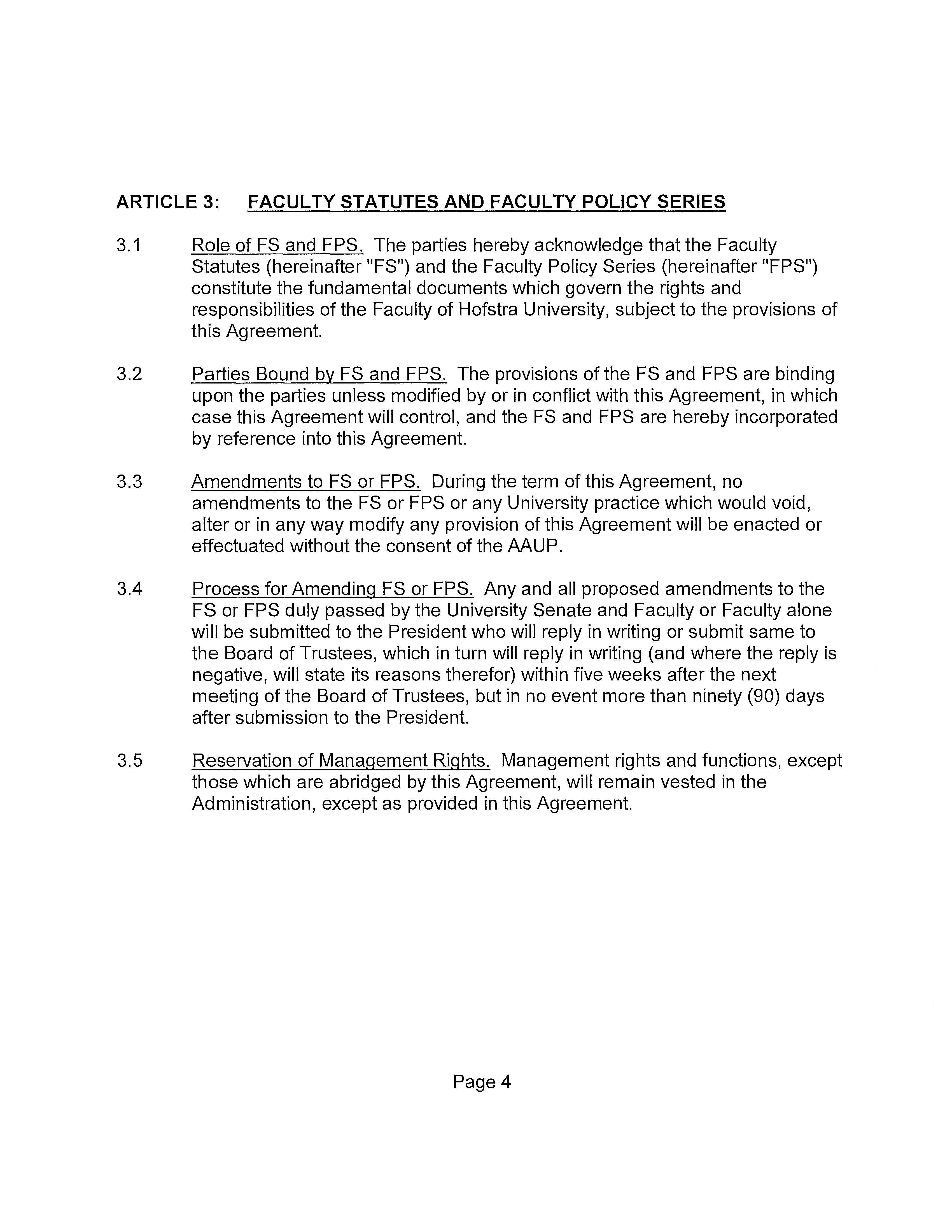
Page4
ARTICLE 4: GENERAL RELATIONSHIP BETWEEN THE AAUP AND THE UNIVERSITY
4.1 Agreement between University and AAUP. This Agreement will be binding upon and is exclusively between the AAUP and Hofstra University. All rights and privileges claimed under the terms of this Agreement will be enforceable only by the AAUP and Hofstra University unless otherwise specifically provided herein.
4.2 Incorporation into Faculty Contracts. The rights, privileges and obligations of faculty members set forth in this Agreement will be incorporated into and made part of any individual contract of employment between a faculty member and the University; all such rights, privileges, and obligations claimed under such individual contracts of employment will be enforceable initially through the procedures hereinafter set forth in this Agreement or in the FS or FPS, whichever is applicable. In the event of a conflict between the terms of an individual contract and the terms of this Agreement, the latter will be controlling. This Agreement will be incorporated by reference in employment contracts issued to faculty members. The University will make copies of this Agreement, the FS and the FPS available on its website.
4.3 Other Organizational Structures. The presently constituted organizations within the University, i.e., the University Senate or any other similar body composed in whole or in part of the faculty, will continue to function at the University, provided that the actions thereof may not directly or indirectly repeal, rescind, or otherwise modify the terms and conditions of this Agreement.
4.4 Right of AAUP to Conduct Business. Duly authorized representatives of the AAUP will be permitted to transact official AAUP business on University property at all reasonable times, provided that this will not interfere with or interrupt normal University operations or other faculty members in the performance of their duties.
4.5 Right of AAUP to Communicate with Faculty. The AAUP will have the right to post notices of its activities and matters of AAUP concern on faculty bulletin boards at locations hereafter to be agreed upon between the AAUP and the Administration. The AAUP will be permitted free use of intra-University mail and intra-University telephone service for communications to the faculty.
Page 5

4.6 AAUP Office and Meeting Space. The Administration will provide the AAUP with an appropriate furnished office, accessible to persons with disabilities, in the main Administration building or in a building in close proximity to the main Administration building. In addition, the AAUP will be permitted use of appropriate facilities at the University for its larger meetings, so long as facilities are available and the AAUP complies with the rules and regulations relating to use of such facilities applicable to all members of the University community.
4.7 AAUP Departmental Support. The AAUP will be entitled to use the services of departmental secretaries for AAUP business, with the consent of the chairperson of the affected department, which consent shall not be unreasonably withheld. It is understood that the AAUP's use of such secretarial service will not interfere with the normal business of the department, and that the Administration will provide alternative secretarial service in the event that departmental secretarial service is not available.
4.8 Structure of Joint Standing Committee. A Joint Standing Committee (JSC) will be established each year consisting of eight (8) representatives: the President of the AAUP and three (3) representatives, chosen by the Executive Committee of the AAUP; and the Provost and three (3) other members of the Administration chosen by the President. The JSC will deal with problems and questions relating to this Agreement as well as those issues specifically delegated to it in this Agreement. This committee will meet at least twice each Fall and Spring semester each academic year. In addition, the committee will meet as necessary at the request of either of the parties. The committee will discuss and attempt to amicably resolve any and all issues other than those specifically provided for in other Articles of this Agreement.
Page 6
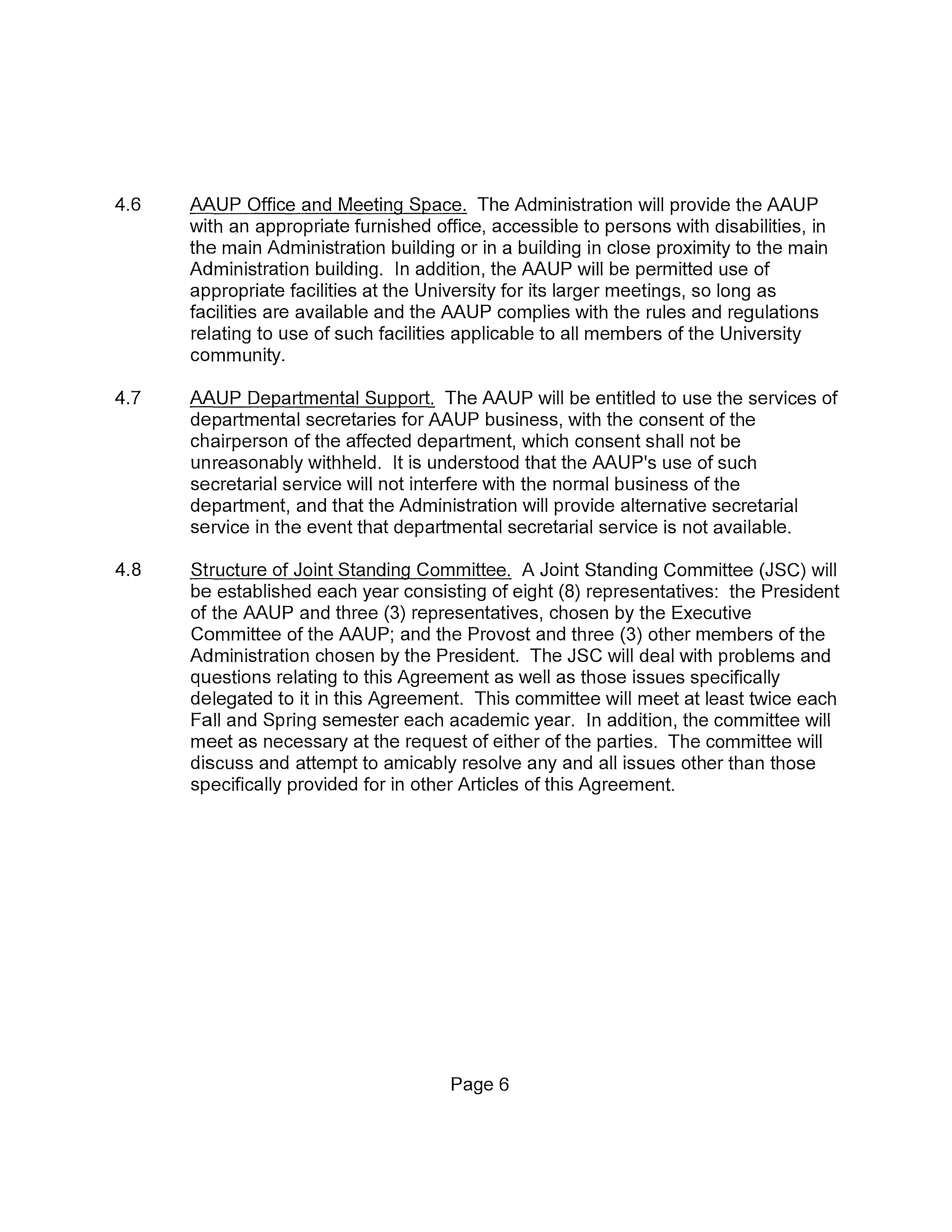
5.1 Procedures for Appointment, Reappointment, Non-Reappointment, Promotion and Tenure. This Article and the appropriate sections of the FS and FPS shall govern initial appointment, reappointment, non-reappointment, promotion, and tenure policies for full-time members of the faculty; and appointment of special status members of the faculty.
1. Each department shall have three (3) types of personnel committees. The Departmental Personnel Committee (DPC) shall be responsible for reviewing initial appointments and reappointments of all full-time, and special status faculty; the Ad Hoc Promotion Committee shall be responsible for reviewing full-time faculty applications for promotion, except those made simultaneously with a tenure application; and the Ad Hoc Tenure Committee shall be responsible for reviewing all tenure applications. The procedures set forth below with respect to DPC procedures shall govern all three committees unless otherwise specified. Except as provided herein for the Library, the general steps which the above personnel recommendations shall follow shall be:
2. Departmental Personnel Committee (DPC) or applicable Committee and Department Chairperson make a recommendation to the
3. Dean, who
(a) Refers it to the School or Division Faculty Personnel Board (FPB) for a recommendation back to the Dean:
(1) in all tenure cases; or
(2) if the DPC's or the Department Chairperson's recommendations are for non-reappointment, or against promotion; or
(3) if the DPC's and the Department Chairperson's recommendations disagree on initial appointment; or
Page 7
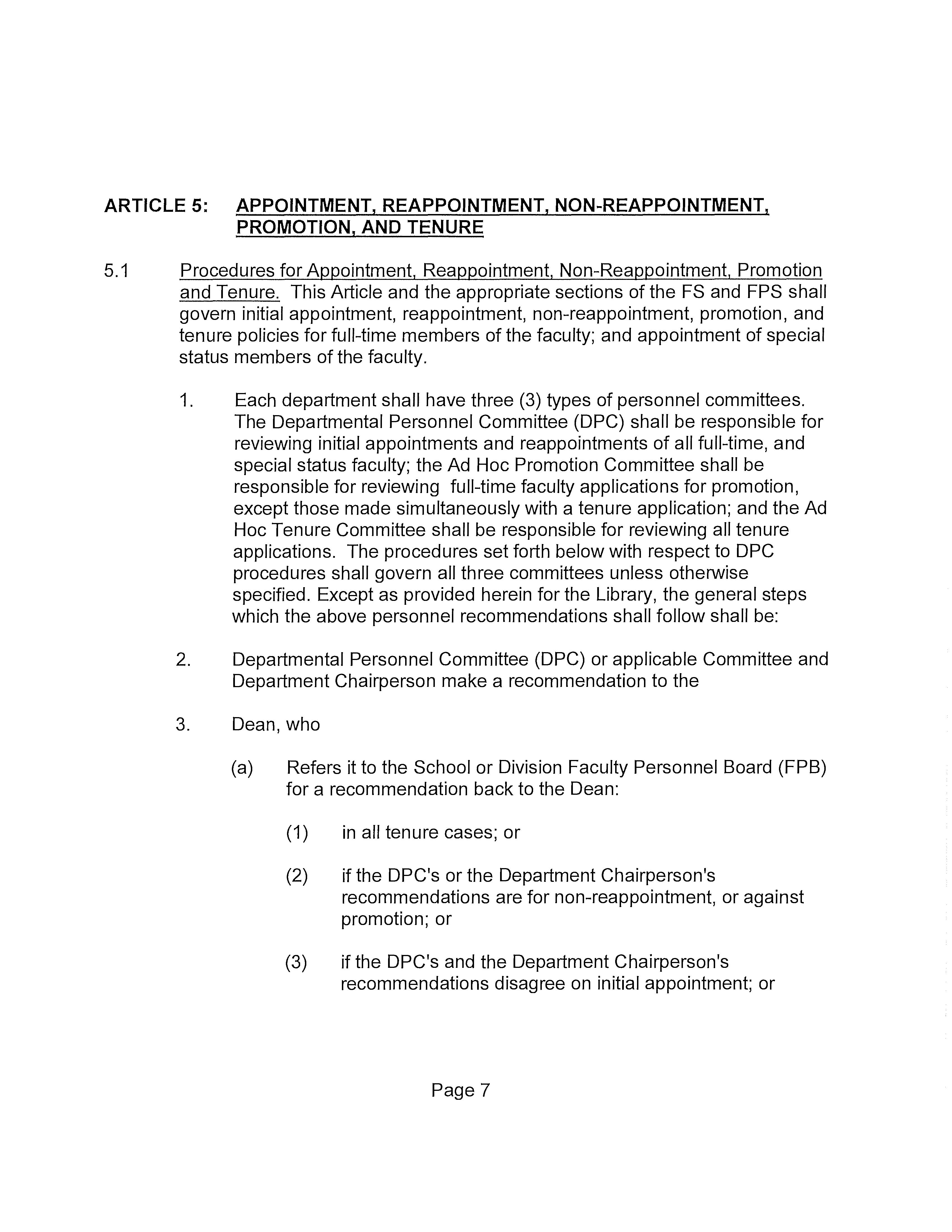
(4) if the Dean seeks advice or indicates preliminary disagreement with the DPC's and Department Chairperson's recommendations, which recommendations are in agreement.
(b) Makes a recommendation to the
4. Provost, who
(a) Refers it to the University Appeals Board (UAB) for a recommendation back to the Provost:
(1) if there is disagreement between the Dean's and the DPC's or applicable Committee's recommendation on tenure, initial appointment, reappointment, promotion, or non-reappointment of faculty; or
(3) if the Provost seeks advice or indicates preliminary disagreement with the FPB and Dean's recommendations, or with the DPC's or applicable Committee's and Dean's recommendation, which recommendations are in agreement.
(b) Makes a recommendation to the
5. President; who makes a recommendation to the
6. Board of Trustees.
7. Personnel Review Procedures.
Committees and administrators reviewing a case shall review a case independent of the opinions about that case of committees or administrators who will review the case at a later step.
Page 8
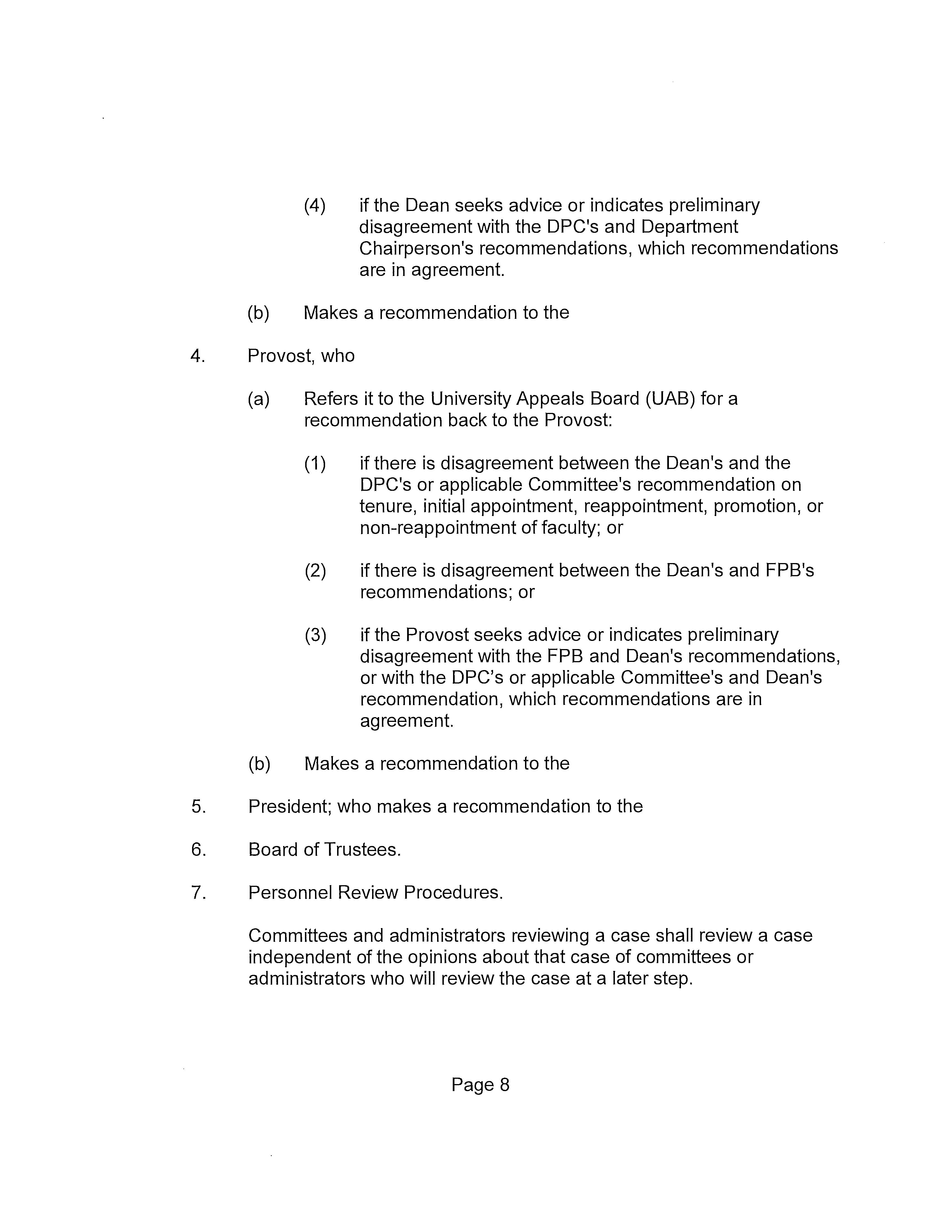
All appropriate materials (e.g., vitae, personal statements, publications, CTR ratings) shall be posted on a Blackboard site that is accessible only by the appropriate personnel committee or designated recommender at the specific time that the committee or individual is reviewing the personnel matter. The Blackboard discussion and chat capability functions will also be available for use during this period.
No faculty member under review shall be asked to provide nor shall such faculty member provide hard copies of any materials to any other person, including committees and administrators reviewing the case. Any request for hard copies shall be made to the Committee Chair only.
Where a signature or written consent is required by the provisions of this Agreement, a person may provide their signature or written consent ( or non-consent) by e-mail, provided that the e-mail shall originate from the sender's Hofstra e-mail account. The person responsible for collecting the signatures shall maintain the record of the e-mail consents (or dissents) and shall attach to the document a note indicating the names of the persons from whom e-mail consents (or dissents) have been obtained, in lieu of attaching the e-mails to the document.
5.2 DPC Formation Procedures. By September 1 of each academic year the Department Chairperson shall invite all eligible members of each department to serve on a Departmental Personnel Committee (DPC). Except in departments with insufficient tenured faculty, only tenured and tenuredesignate members of the department shall be eligible to serve on the DPC. In those departments which do not have sufficient tenured faculty any untenured members who have served in the department as full-time faculty for at least two (2) full years and who have not been denied tenure or reappointment are eligible to serve on the DPC.
Eligible members must indicate their willingness to serve in writing; by agreeing to serve, members agree to regularly attend meetings of the DPC and to participate in the array of matters before the committee. By the second week of the Fall semester, the Department Chairperson shall notify the department faculty, in writing, of the DPC membership and shall convene the first meeting of the DPC, at which time the members of the DPC shall elect a Chairperson from among the tenured members of the committee. The
Page 9
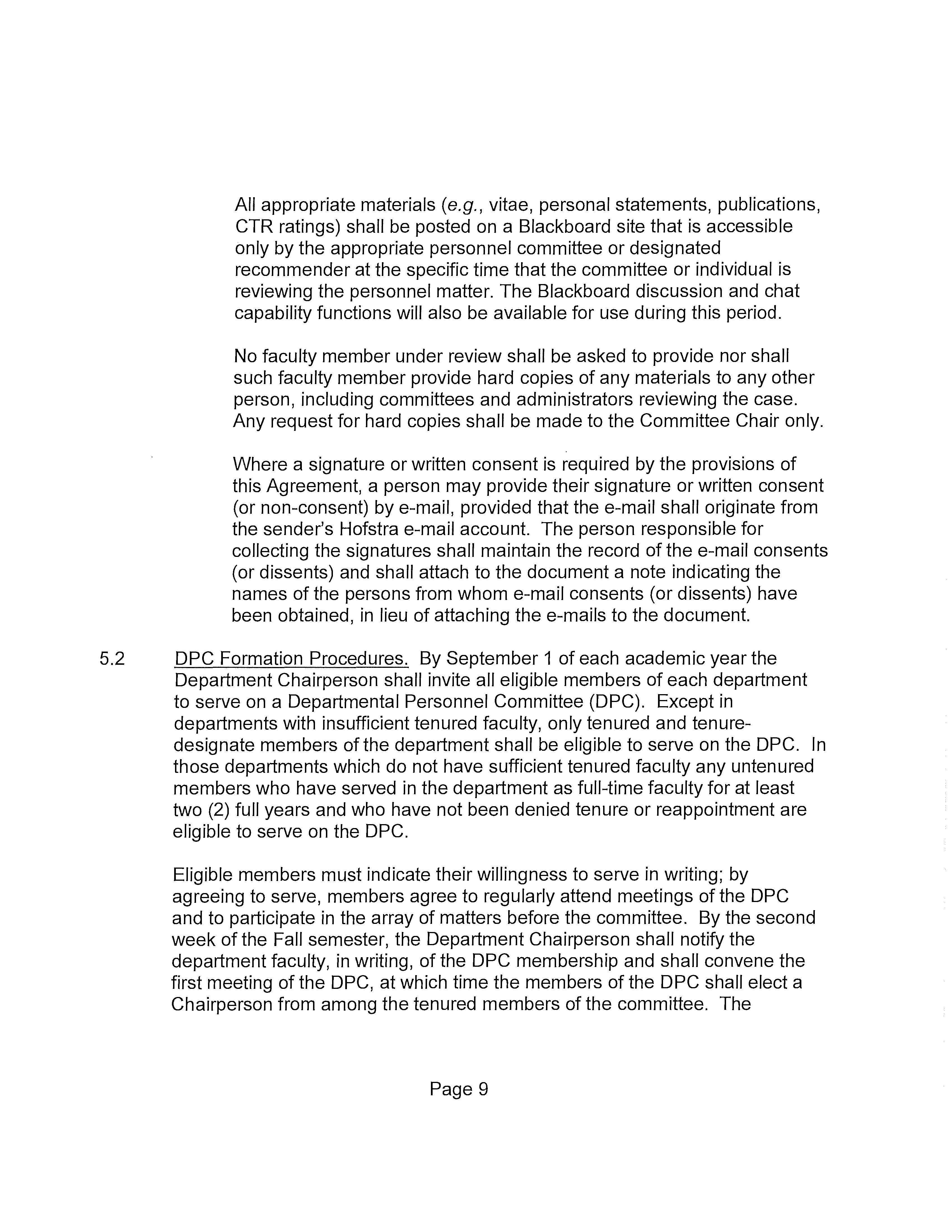
Department Chairperson shall inform the Dean and the AAUP, in writing, of the faculty serving on the DPC and the name of the DPC Chairperson.
Eligible faculty on leave during the fall semester may elect membership in the DPC in the fall as specified above or may elect membership in the spring by notifying the Department Chairperson and the Chairperson of the DPC by the end of the second week of the Spring Semester. Once formed, a faculty member who has not elected to be a member of the DPC may neither participate in DPC deliberations nor vote on DPC recommendations.
The DPC must include at least three (3) faculty members. If a department has fewer than three (3) full-time members who meet the above requirements and are willing to serve, additional members of the DPC shall be chosen by the department's full-time faculty from the tenured bargaining unit members of other related academic areas. If there are no tenured faculty in a department, the fulltime faculty in the department shall choose a DPC Chairperson from among the tenured faculty in a related department. A representative to the FPB from another department in the same academic unit is ineligible to serve on the DPC.
In departments which have regular adjunct faculty (as defined in Article 2.2), one (1) or more regular adjunct faculty members, as set forth in Article 24, shall be elected annually by the regular adjunct faculty in the department to serve as a voting member of the DPC. The election shall be run by the Chair of the Department.
No faculty member may participate when the DPC considers a case involving the person or someone who is or was a member of the person's immediate family, or the person's domestic partner or significant other. Further, faculty members shall not be eligible to serve on a DPC case when it is considering the case of a candidate for promotion to a higher faculty rank than that held by the faculty member. In addition, a not-yet-tenured faculty member on the DPC shall not be eligible to serve on cases of reappointment when (1) the years of service of the candidate is equal to or greater than the faculty member and/or (2) the candidate is standing for reappointment at the same time as the faculty member. A department's representative to the FPB may serve on the department's DPC.
Each DPC shall adopt its own practices and procedures consistent with those in this Article 5 as well as those in the Faculty Statutes and Faculty Policy
Page 10
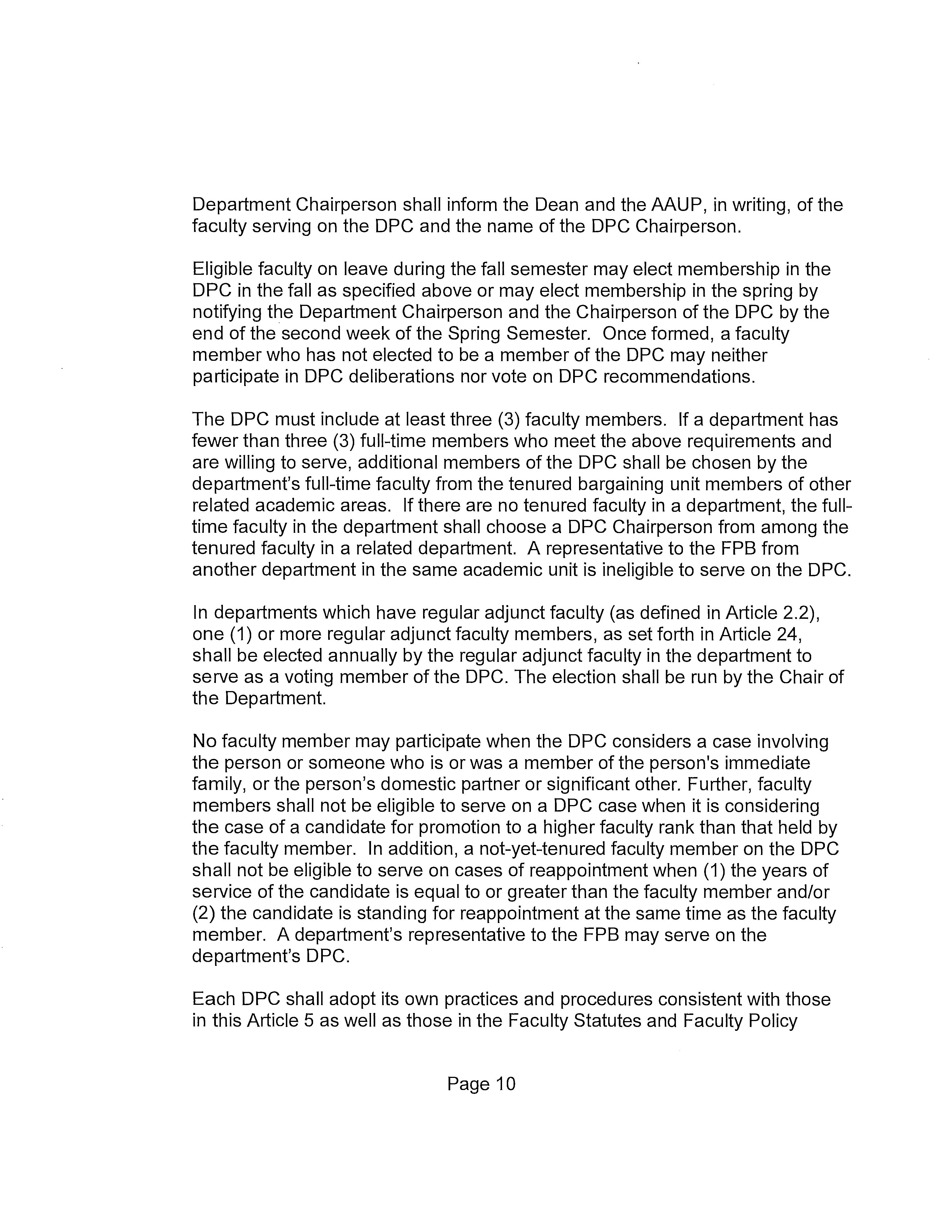
Series, such procedures to be filed with the Department Chairperson, the Dean and the Provost as well as the AAU P.
For purposes of this Article 5.2, the Library shall be deemed a department.
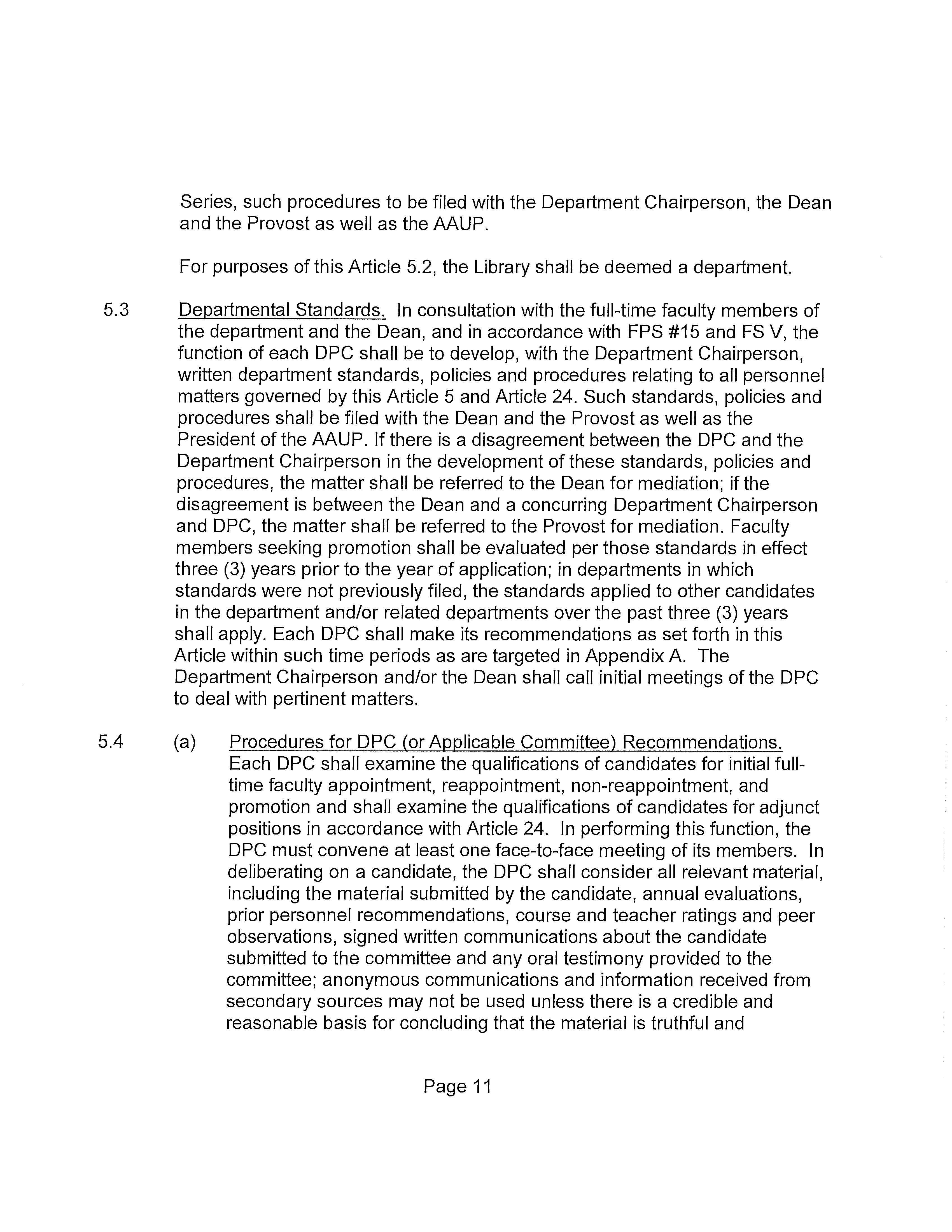
5.3 Departmental Standards. In consultation with the full-time faculty members of the department and the Dean, and in accordance with FPS #15 and FS V, the function of each DPC shall be to develop, with the Department Chairperson, written department standards, policies and procedures relating to all personnel matters governed by this Article 5 and Article 24. Such standards, policies and procedures shall be filed with the Dean and the Provost as well as the President of the AAUP. If there is a disagreement between the DPC and the Department Chairperson in the development of these standards, policies and procedures, the matter shall be referred to the Dean for mediation; if the disagreement is between the Dean and a concurring Department Chairperson and DPC, the matter shall be referred to the Provost for mediation. Faculty members seeking promotion shall be evaluated per those standards in effect three (3) years prior to the year of application; in departments in which standards were not previously filed, the standards applied to other candidates in the department and/or related departments over the past three (3) years shall apply. Each DPC shall make its recommendations as set forth in this Article within such time periods as are targeted in Appendix A. The Department Chairperson and/or the Dean shall call initial meetings of the DPC to deal with pertinent matters.
5.4 (a) Procedures for DPC (or Applicable Committee) Recommendations. Each DPC shall examine the qualifications of candidates for initial fulltime faculty appointment, reappointment, non-reappointment, and promotion and shall examine the qualifications of candidates for adjunct positions in accordance with Article 24. In petforming this function, the DPC must convene at least one face-to-face meeting of its members. In deliberating on a candidate, the DPC shall consider all relevant material, including the material submitted by the candidate, annual evaluations, prior personnel recommendations, course and teacher ratings and peer observations, signed written communications about the candidate submitted to the committee and any oral testimony provided to the committee; anonymous communications and information received from secondary sources may not be used unless there is a credible and reasonable basis for concluding that the material is truthful and
Page 11
accurate. Should the DPC wish to obtain additional information from other individuals who have knowledge of the candidate, those individuals should be asked to attend a meeting of the committee or to comment in writing. The Department Chairperson shall make available to the Chairperson of the DPC one copy of all peer review reports as well as prior DPC recommendations, prior Chairperson recommendations and annual evaluations. This material is confidential and is for the use of the DPC members solely during their deliberations. The review process shall include consultation with the Department Chairperson. Such consultation shall include either a meeting between the Department Chairperson and the DPC or a written exchange between the DPC and the Department Chairperson; discussions between individual DPC members and the Department Chairperson shall not be construed to meet the requirements of consultation with the DPC. Although the DPC may invite the Department Chairperson to meetings of the DPC as a resource person, the Department Chairperson shall not be present when the DPC deliberates and/or votes on a candidate's qualifications. All information regarding candidates that is received by the Chairperson of the DPC shall be shared with both the other members of the DPC and the Department Chairperson; all recommendations received by the Chairperson of the DPC from subsequent steps in the process shall also be shared with all members of the DPC.
In both unanimous and split recommendations of the DPC in regard to appointment, reappointment and promotion, the written recommendation must reflect the DPC's assessment of the candidate with respect to teaching, scholarship and service. In cases of reappointment of full-time faculty, the recommendation must also indicate the DPC's assessment of the candidate's prospects for tenure. In split decisions, the recommendation must indicate the vote and must reflect both majority and dissenting views of the candidacy. All members of the DPC must have an opportunity to review and comment on the recommendation before it is sent; the recommendation must be signed (or approved in an attached e-mail message) by at least twothirds (2/3) of the members voting on the case. A faculty member's signature indicates that the recommendation accurately reflects the points made during deliberations; the signature does not necessarily indicate agreement with the results of the final vote. A member of the
Page 12
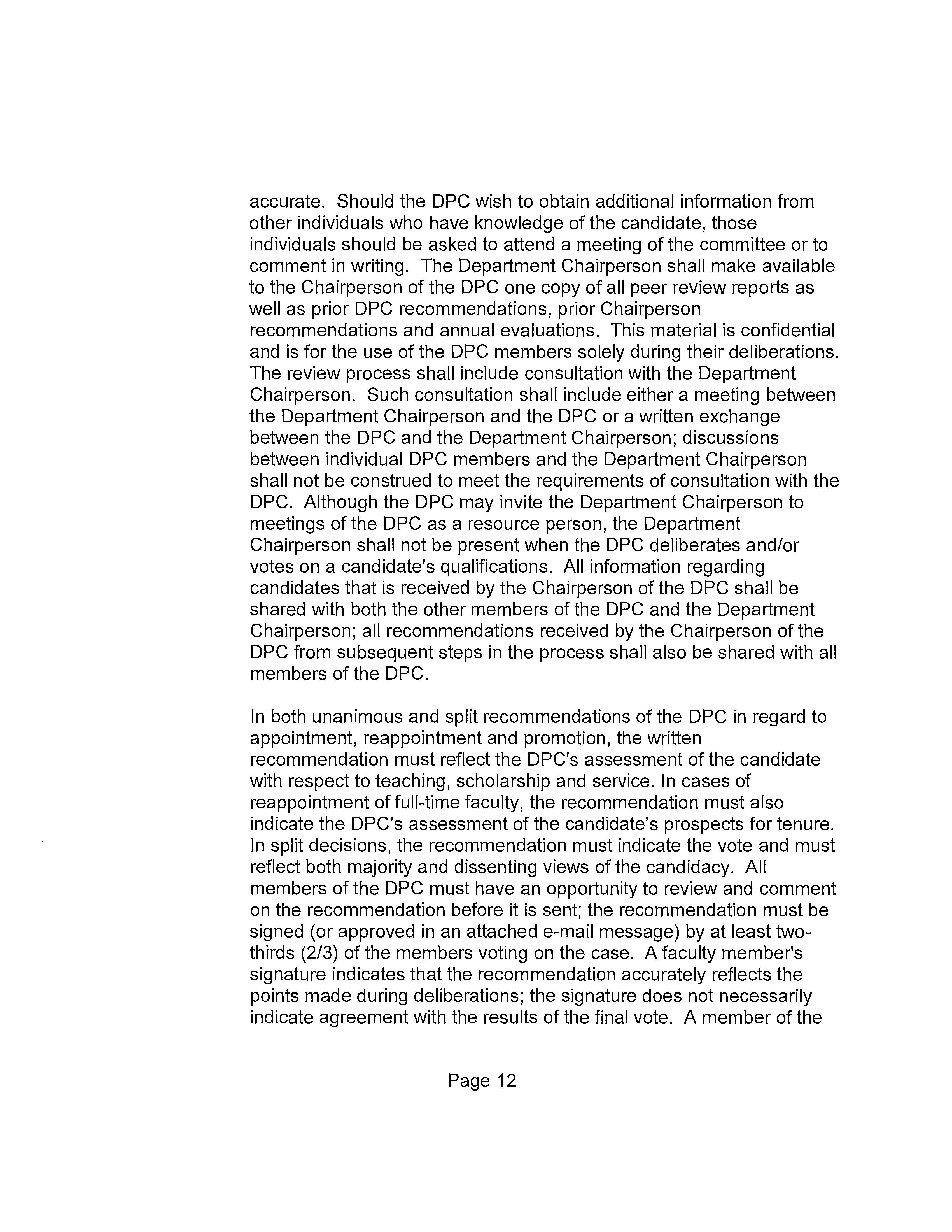
DPC dissenting from either the results of the vote or the substance of the recommendation may submit a separate minority letter at the same time that the majority recommendation is submitted; such minority letters shall be distributed to all parties receiving the DPC recommendation.
Subsequent to its deliberations and vote, the DPC shall forward its recommendation, in writing, to the Dean, with copies to the Department Chairperson, the President of the AAUP, and, except in cases of initial appointment, to the affected individual. All recommendations and minority letters must be signed; however, candidates for reappointment and promotion shall receive copies of minority letters with the signatures removed. The Department Chairperson shall likewise forward their recommendation to the Dean, the President of the AAUP, and, except in cases of initial appointment, the affected individual.
In cases of initial appointment only, recommendations from the DPC, from dissenting members of the DPC and/or from the Department Chairperson shall not be forwarded to the affected individual; candidates who will not be recommended for the position shall be so notified by the Department Chairperson. Each DPC and Department Chairperson shall jointly develop procedures for communicating with successful candidates prior to receipt of the appointment letter from the President; such communication shall indicate the nature of any issues that the candidates should address prior to the consideration of their reappointment.
If the DPC's and the Chairperson's recommendations are in disagreement on initial appointment; or if either recommends nonreappointment, or against promotion; or if the Dean indicates preliminary disagreement with the DPC's and Department Chairperson's recommendations, which recommendations are in agreement; prior to making their recommendation, the Dean shall forward the case to the School, College or Divisional Faculty Personnel Board (FPB) for its review and recommendation.
(b) Library Procedures. In Library departments in which there are Library faculty and in which there is not a Department Chairperson, the
Page 13
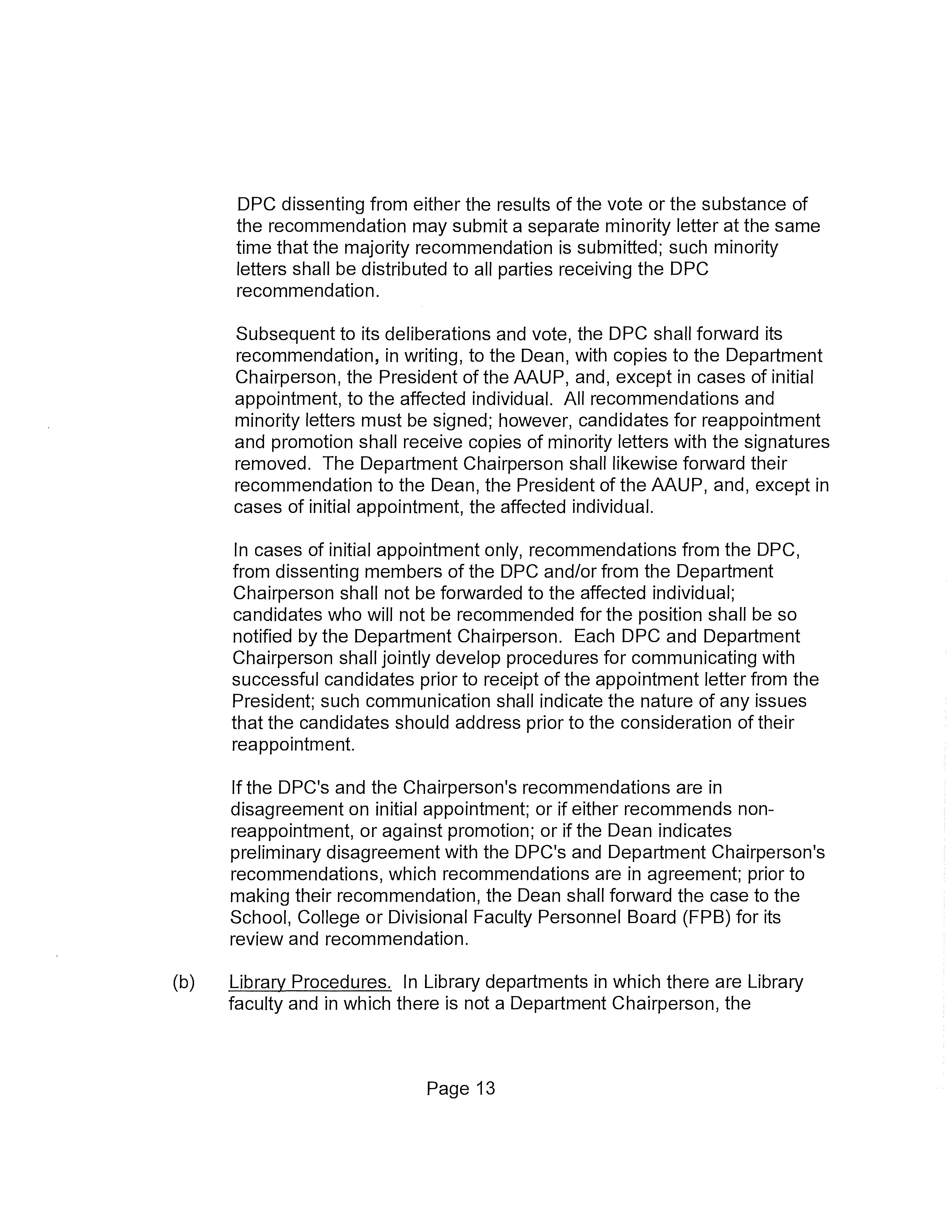
5.5
5.6
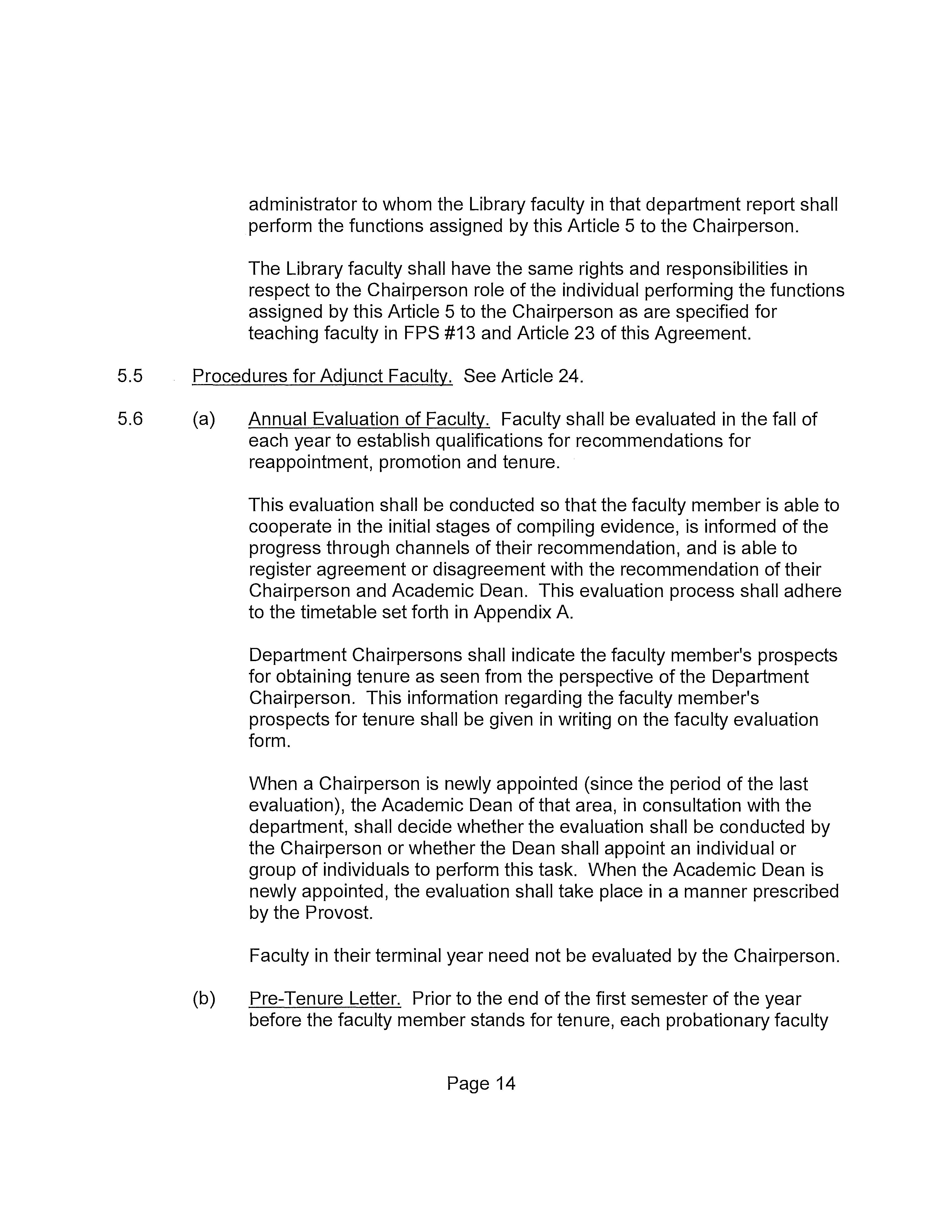
administrator to whom the Library faculty in that department report shall perform the functions assigned by this Article 5 to the Chairperson.
The Library faculty shall have the same rights and responsibilities in respect to the Chairperson role of the individual performing the functions assigned by this Article 5 to the Chairperson as are specified for teaching faculty in FPS #13 and Article 23 of this Agreement.
Procedures for Adjunct Faculty. See Article 24.
(a) Annual Evaluation of Faculty. Faculty shall be evaluated in the fall of each year to establish qualifications for recommendations for reappointment, promotion and tenure.
This evaluation shall be conducted so that the faculty member is able to cooperate in the initial stages of compiling evidence, is informed of the progress through channels of their recommendation, and is able to register agreement or disagreement with the recommendation of their Chairperson and Academic Dean. This evaluation process shall adhere to the timetable set forth in Appendix A.
Department Chairpersons shall indicate the faculty member's prospects for obtaining tenure as seen from the perspective of the Department Chairperson. This information regarding the faculty member's prospects for tenure shall be given in writing on the faculty evaluation form.
When a Chairperson is newly appointed ( since the period of the last evaluation), the Academic Dean of that area, in consultation with the department, shall decide whether the evaluation shall be conducted by the Chairperson or whether the Dean shall appoint an individual or group of individuals to perform this task. When the Academic Dean is newly appointed, the evaluation shall take place in a manner prescribed by the Provost.
Faculty in their terminal year need not be evaluated by the Chairperson.
Pre-Tenure Letter. Prior to the end of the first semester of the year before the faculty member stands for tenure, each probationary faculty
Page 14
(b)
member shall receive an analysis of tenure criterion number 4 (FPS 15, II, A4 or 84: "fulfillment of some essential function in the lqhg-range needs of the department and/or the University") in relationship to the individual's prospects for tenure. This analysis shall state specifically whether it is "likely" or "unlikely" that the probationary faculty member shall satisfy tenure criterion number 4. The Provost shall provide the Dean, Chairperson, Chair of the DPC and the AAUP with data regarding departmental enrollments, average class size, number of majors, number of tenured faculty, announced retirements, direction of the program(s), use of adjuncts and overload, and other relevant information. The Dean of the appropriate School or college, in consultation with the Chairperson, shall prepare the foregoing written analysis based on these data. The written analysis shall be given to the faculty member with copies forwarded to the DPC and the Provost. If the Provost disagrees with the analysis, they shall so notify the individual, the Dean, the Department Chairperson and the DPC, in writing, explaining the reasons for their disagreement. If the DPC disagrees with the analysis, it shall so notify the Provost, with copies to the individual, the Dean, and the Department Chairperson, explaining the reasons for its disagreement. If the Provost disagrees with the position of the DPC, they shall so notify the DPC, with copies to the Dean, the Department Chairperson and the individual, explaining the reasons for the disagreement. If any such analysis or disagreement centers on the match between the individual's qualifications and the qualifications of faculty needed to fulfill the direction of the program(s), the individual may submit an analysis of their qualifications to all involved administrators and governance bodies and may request an evaluation on this matter from the FPB, such evaluation to be sent to the Provost with copies to the individual, the DPC, the Department Chairperson, the Dean, and the President of the AAUP. The Provost, at their option, may request further evaluation by the UAB, such evaluation to be sent to all individuals and governance bodies receiving the evaluation of the FPB. Any disagreement covered by this Article shall be submitted within thirty (30) days after the receipt of the analysis or reply thereto with which it is in disagreement.
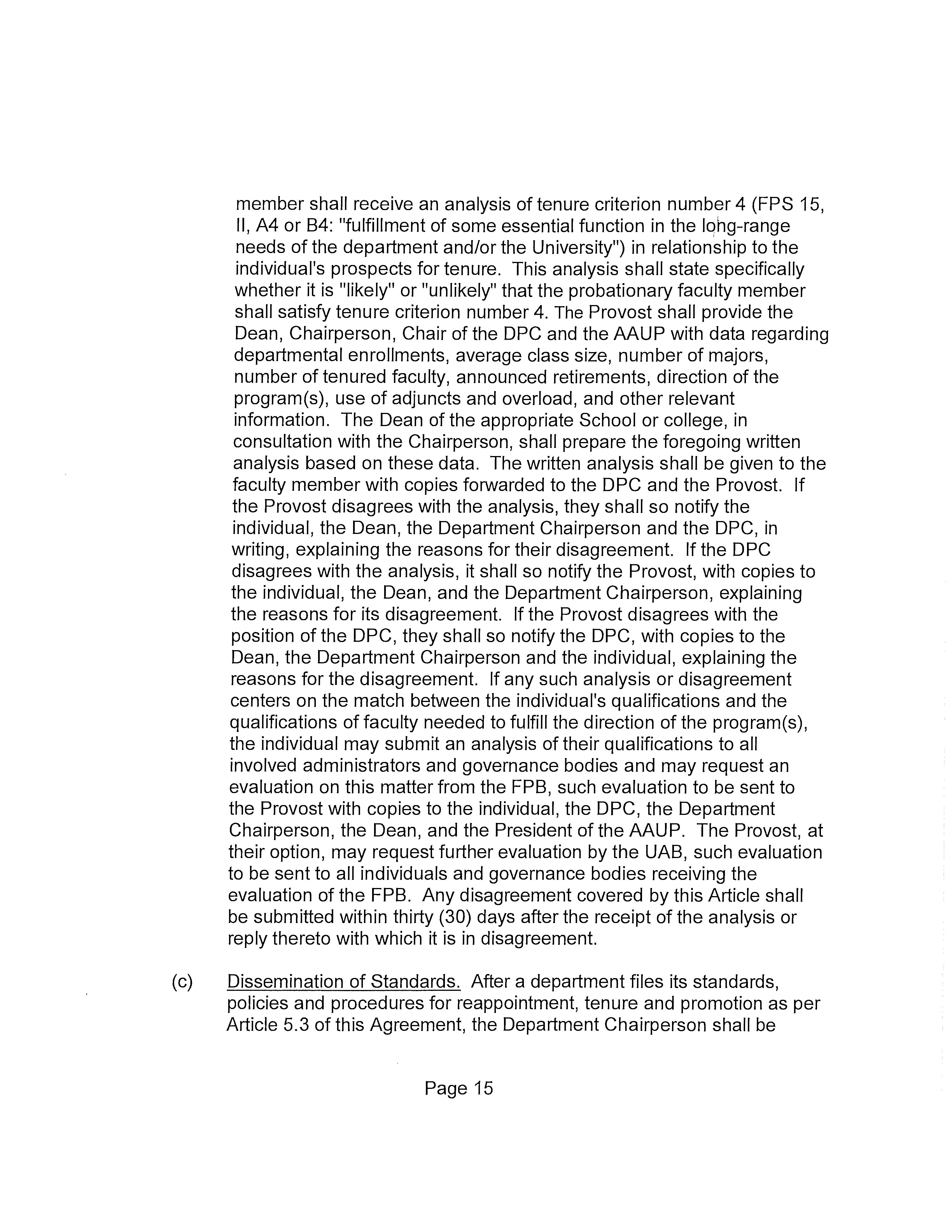
(c) Dissemination of Standards. After a department files its standards, policies and procedures for reappointment, tenure and promotion as per Article 5.3 of this Agreement, the Department Chairperson shall be
Page 15
responsible for disseminating that information to faculty. Such dissemination shall include, but not be limited to, the following:
(1) Prior to the end of a faculty member's first semester of full-time faculty service, the Department Chairperson shall send to the faculty member, with a copy of the cover letter to the Dean, the department's standards for reappointment, tenure and promotion and the documentation necessary to evaluate the faculty member on those standards; this document shall serve as the basis for evaluating the faculty member for tenure.
(2) Prior to the end of the first semester of the fifth year of a faculty member's tenure probationary period, the Department Chairperson shall send to each probationary faculty member, with copies to the Provost, Dean and DPC Chairperson, a memorandum indicating the documentation that will be required for making a tenure recommendation. This memorandum shall note the number of peer observations in the candidate's file and shall describe the criteria for tenure as identified in FPS #15 and as interpreted in respect to the standards adopted by the faculty member's department. Tenure candidates with reduced tenure probationary periods shall receive this notification at the end of the semester prior to the semester in which they will stand for tenure.
5.7 Ad Hoc Tenure and Ad Hoc Promotion Committees. Each department shall establish Ad Hoc Tenure and Ad Hoc Promotion Committees consisting of fulltime faculty members in accordance with the FPS. The procedures below shall govern both types of Committees. In the Library, the Ad Hoc Tenure Committee shall be formed from among the tenured and tenure-designate faculty in the unit. If an insufficient number of eligible faculty are available to serve on a Committee, the full-time faculty of the unit shall elect, by majority vote, additional members from other units in the University. In a promotion case, the candidate may submit a list of those faculty whom they believe are best suited to serve on the Committee prior to the election. Procedures described in the FPS shall be followed. Allegations of a breach of the FPS or the FS shall be referred to the Joint Standing Committee for resolution. Notwithstanding the above, however, the AAUP may grieve a breach of procedures.
Page 16
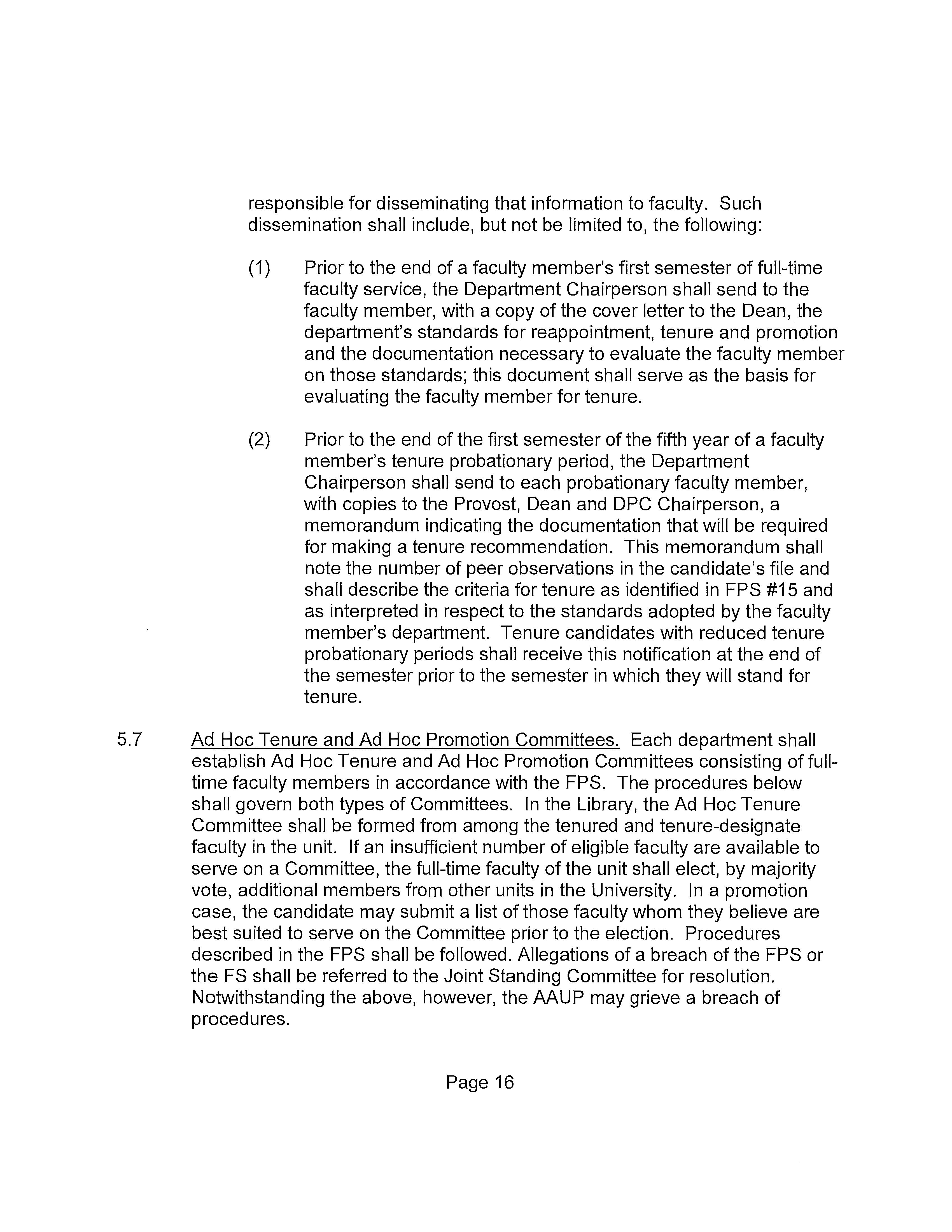
Minutes of the Committee are to be made part of the file; in order to retain the confidentiality of the discussion, minutes shall record the procedures and actions of the committee and the topics under discussion, but shall not record substantive statements about the candidate's qualifications. Should the Committee wish to get additional information from other individuals who have knowledge of the candidate, those individuals should be asked to attend a meeting of the Committee or to reply in writing. The Department Chairperson shall make available to the Chairperson of the Committee one copy of all peer review reports as well as prior DPC recommendations, prior Chairperson recommendations and annual evaluations. In deliberating on a candidate, the Committee shall consider all relevant material, including the material submitted by the candidate, annual evaluations, prior personnel recommendations, course and teacher ratings and peer observations, signed written communications about the candidate submitted to the committee and any oral testimony provided to the committee; anonymous communications and information received from secondary sources may not be used. This material is confidential and is for the use of the Committee members solely during their deliberations.
The written statements about the candidate that are shared by the members of the Committee prior to their decision are not to be included in, or forwarded with, the file. However, any member of the Committee may forward their statement in accord with the procedures specified for minority letters in FPS #15. All letters included in the file that are written about a candidate by administrators or, individually or jointly, by members of peer review bodies (i.e., the Ad Hoc Tenure or Promotion Committee, the FPB or the UAB) reviewing the case must be shared with the candidate. In the case of minority letters, however, the candidate shall receive a copy with the signatures removed.
The Department Chairperson shall not participate on a Committee as a member, but should be consulted by the Committee as a resource person for input that can be used by the Committee. The Department Chairperson shall not participate in the deliberations of the Committee nor vote on the final decision of the Committee.
In cases where tenure is being considered on initial appointment, all relevant procedures in Article 5.1, 5. 7 and 5.13 and the FPS must be followed.
Page 17
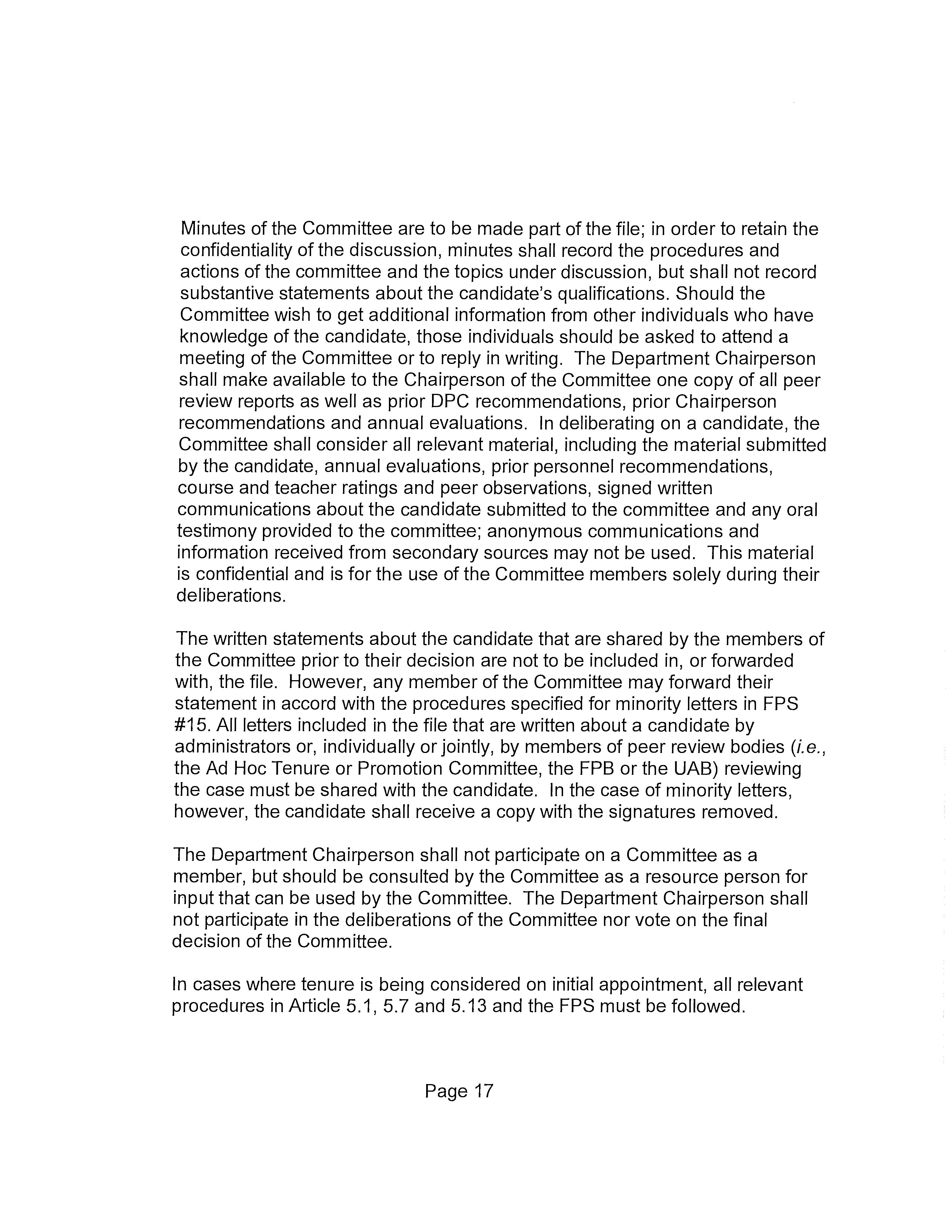
5.8 Transmission of Ad Hoc Tenure and Ad Hoc Promotion Committees' Recommendations. The written recommendation of the Committee shall be forwarded to the Dean, with copies to the individual faculty member, to the Department Chairperson, and the President of the AAUP.
5.9 (a) Faculty Personnel Board. Each School and each division of the Hofstra College of Liberal Arts and Sciences shall establish a Faculty Personnel Board. The FPB shall consist of one tenured or tenure-designate faculty member and one alternate from each department to be elected by all full-time faculty from the department.
(b) Library. The Faculty Personnel Board for the Library shall consist of the Chairpersons of all of the other Faculty Personnel Boards. Each FPB shall elect an alternate to sit on the Library FPB if the Chairperson is unable to do so. The Library Faculty Personnel Board shall be required to have present a full-time tenured library faculty member as a nonvoting resource person during its deliberations. Each Ad Hoc Tenure Committee in the Library shall elect one of its members and one alternate to sit as the resource person on the FPB when it deliberates on the candidate(s) for whom that committee made a recommendation. The Library DPC shall annually elect one of its members and one alternate to sit as the resource person on the FPB when it deliberates on the candidate(s) for whom that committee made a recommendation. In addition, one (1) adjunct faculty member and one (1) alternate shall be elected by the adjunct faculty serving on the other FPBs represented in the membership of the Library FPB from among their members; the adjunct faculty member sitting on the FPB shall vote only on matters relating to adjunct faculty. When adjunct faculty matters are under review, a regular adjunct Library faculty member as defined in Article 2.2 of this Agreement shall also be invited to participate as a non-voting resource person; the adjunct faculty Library resource person shall be elected annually by the regular adjunct Library faculty, such election to be administered by the Chairperson of the DPC. The function of Library faculty serving as resource persons shall be to explain the nature of librarianship responsibilities and not to advocate for or against the candidate.
(c) FPB Procedures. A member of the Faculty Personnel Board may not be present for, nor participate in, any discussion of, or decisions
Page 18
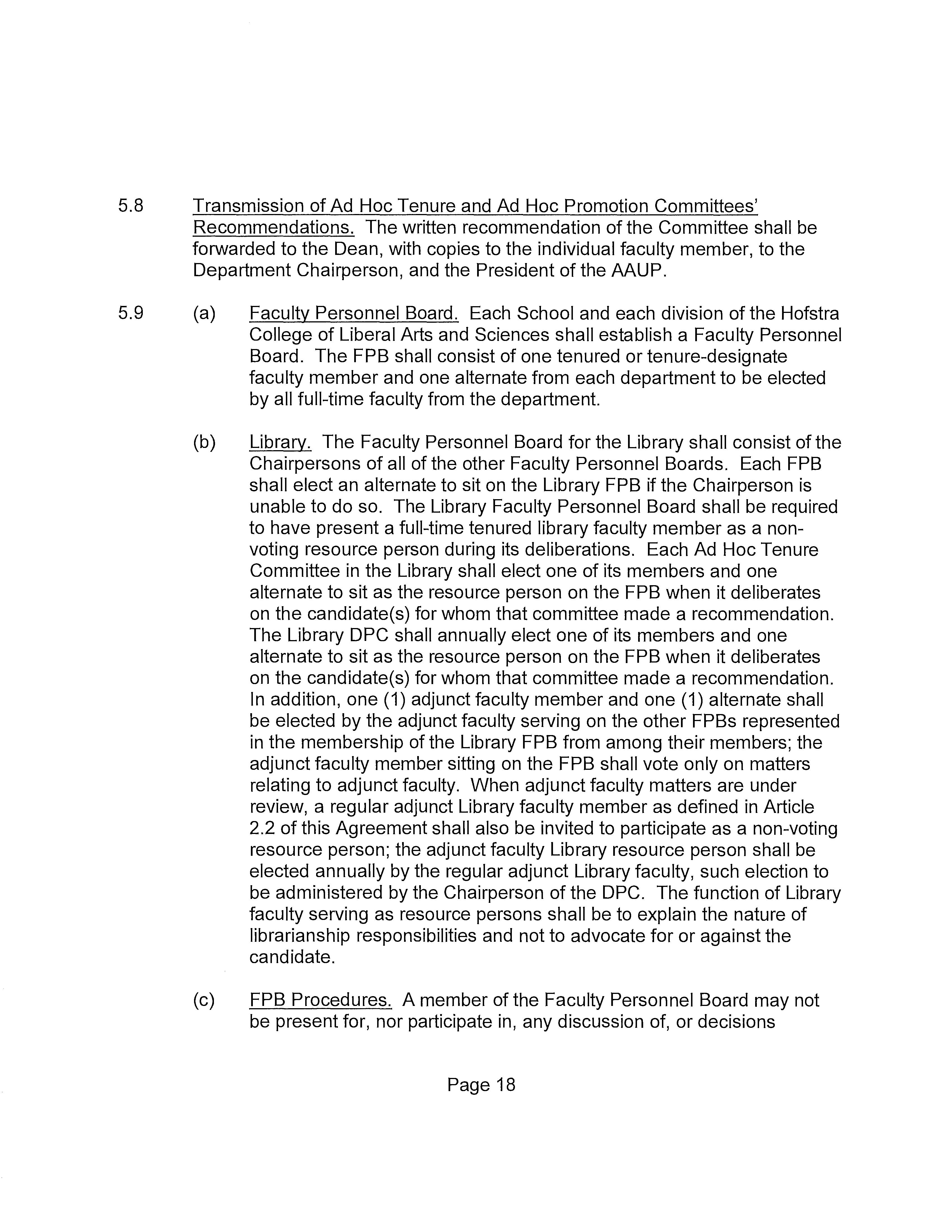
involving, faculty from their own department at the FPB level. Therefore, for any School or division having two or fewer departments, an additional member of the FPB will be elected from among the other faculty in the respective School or division. The FPB may invite representatives with knowledge of the candidate or issues of concern to meet with the Board; such representatives may include the Department Chairperson but not the departmental FPB representative (unless the DPC or Ad Hoc Tenure or Promotion Committee has designated that individual to be their representative). The provisions of Article 5.17 must be followed in respect to members of the DPC or Ad Hoc Tenure or Promotion Committees; individual members of these personnel committees may not be invited to the FPB unless selected as their representative by the Committee. Such representatives shall not violate the confidentiality of specific committee members; their function is to provide further explanation/elaboration of the basis for the Committee's recommendation.
5.10 FPB Term and Chair Selection. Each full-time FPS member shall be elected for a term of two (2) years providing that they remain a full-time faculty member during such period; each adjunct faculty member of the FPS shall be elected for a term of one (1) year. The term of the members of the FPS shall be from September 1 to August 31. However, in the event of the establishment of a new school or division, requiring the establishment of a new FPS, initially, half of the full-time members of such FPS shall be elected for a term of one (1) year and half for a term of two (2) years. Thereafter, each member shall serve for a term of two (2) years provided that they remain a full-time faculty member during such period. Members of the FPS may normally serve for no more than two (2) consecutive terms.
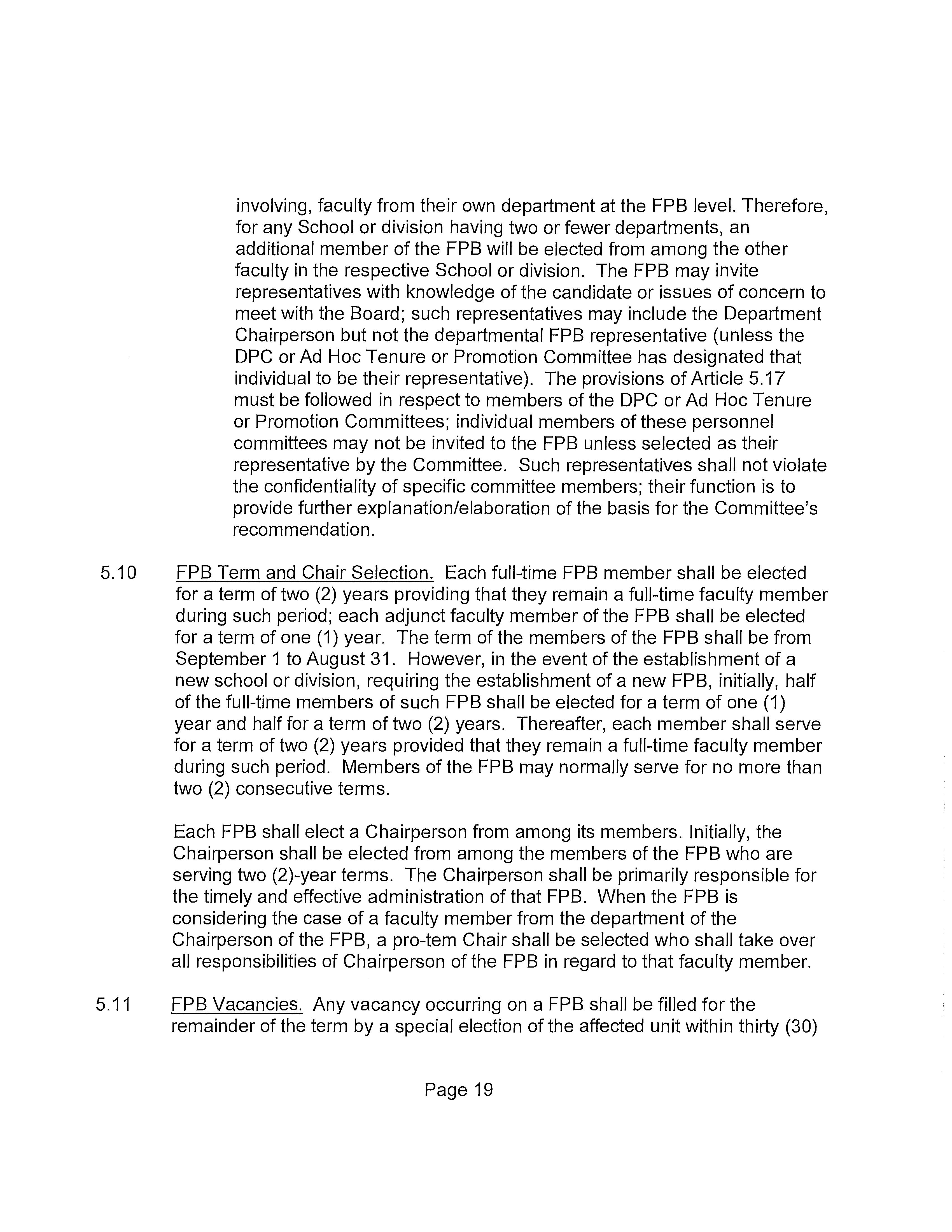
Each FPS shall elect a Chairperson from among its members. Initially, the Chairperson shall be elected from among the members of the FPS who are serving two (2)-year terms. The Chairperson shall be primarily responsible for the timely and effective administration of that FPS. When the FPS is considering the case of a faculty member from the department of the Chairperson of the FPS, a pro-tern Chair shall be selected who shall take over all responsibilities of Chairperson of the FPB in regard to that faculty member.
FPS Vacancies. Any vacancy occurring on a FPS shall be filled for the remainder of the term by a special election of the affected unit within thirty (30)
5.11
Page 19
5.12
5.13 days of such vacancy. The alternate FPB representative elected in accordance with Article 5.9 of this Agreement shall substitute for the regular FPB representative for whom they are an alternate should the regular member be temporarily unable to perform the functions of the position.
FPB Procedures. The function of each FPB shall be to review and make recommendations in all situations described in Article 5.13 below. The deliberations of the FPB shall include review of issues raised in previous recommendations as well as a consideration of whether appropriate criteria have been uniformly applied. Each Faculty Personnel Board shall establish its own procedures provided that such procedures do not contravene any provisions of this Agreement. At the time such procedures are established they must be filed with the Dean, the Provost and the President of the MUP.
FPB Recommendation Procedures. The Faculty Personnel Board shall make recommendations to the Dean in personnel cases for full-time members involving initial appointment, reappointment, tenure, and promotion in the following situations:
(a) when the DPC's and Chairperson's recommendations are in disagreement on initial appointment; or
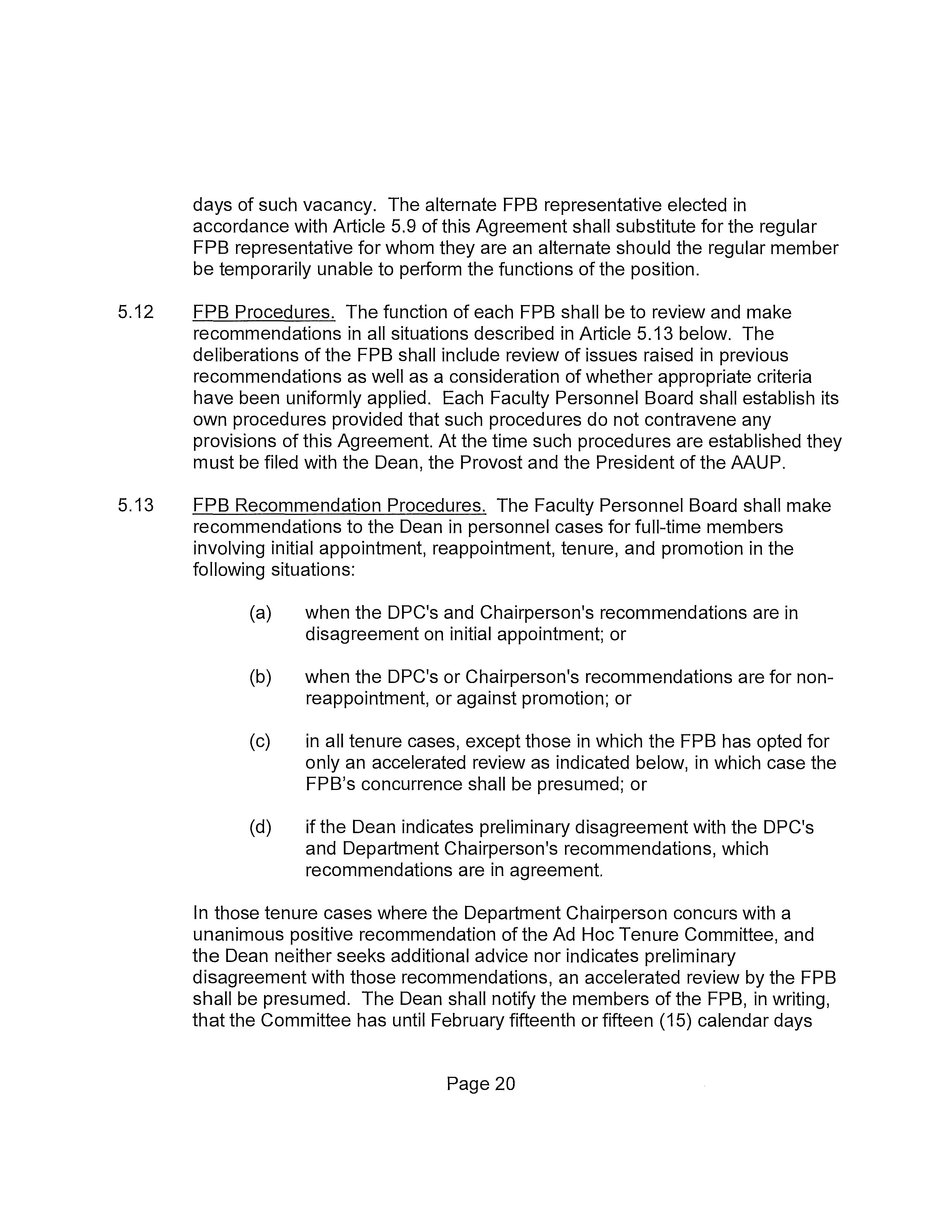
(b) when the DPC's or Chairperson's recommendations are for nonreappointment, or against promotion; or
(c) in all tenure cases, except those in which the FPB has opted for only an accelerated review as indicated below, in which case the FPB's concurrence shall be presumed; or
(d) if the Dean indicates preliminary disagreement with the DPC's and Department Chairperson's recommendations, which recommendations are in agreement.
In those tenure cases where the Department Chairperson concurs with a unanimous positive recommendation of the Ad Hoc Tenure Committee, and the Dean neither seeks additional advice nor indicates preliminary disagreement with those recommendations, an accelerated review by the FPB shall be presumed. The Dean shall notify the members of the FPB, in writing, that the Committee has until February fifteenth or fifteen (15) calendar days
Page 20
from the date of such notification, whichever is later, to submit a statement of intent to undertake a full review of the case. In the absence of a statement of such intent by the designated date, the concurrence of the FPS shall be assumed. The Chairperson of the FPS shall be responsible for determining the sentiment of the Committee, obtaining the necessary signatures for the statement of intent, and informing the Dean of the decision of the FPS. A full review shall be undertaken if at least two (2) of the members of the FPS vote in favor of such review; any member of the FPS may submit a minority opinion concerning the decision for an accelerated review.
The Faculty Personnel Board shall notify the candidate when their case will be heard and shall allow the faculty member being reviewed to appear in person if they so request. The Deans shall provide the Faculty Personnel Board with all relevant information in each case, within the time limits set forth in Appendix A annexed hereto.
In tenure cases, should the FPS indicate preliminary disagreement with concurring recommendations of the Department Chairperson and the Ad Hoc Tenure Committee, the FPS shall, prior to writing its final recommendation, separately meet to discuss its concerns with the Department Chairperson, the individual involved, and a representative from the Ad Hoc Tenure Committee. In such cases, the FPS Chairperson shall notify the Chairperson of the Ad Hoc Tenure Committee, who shall arrange for the election of the committee member with whom the FPS shall consult. Should the final recommendation of the FPS be in disagreement with the concurring recommendations of the Ad Hoc Tenure Committee and Department Chairperson, the Ad Hoc Tenure Committee and the Department Chairperson shall respond to the FPS recommendation; the individual involved may also submit a response. Such responses shall become part of the file, with copies sent to the individual and the President of the AAUP. In split decisions, the FPS recommendation must indicate the number of concurring and dissenting votes and must reflect both majority and dissenting views of the candidacy.
All members of the FPS must have an opportunity to review and comment on the recommendation before it is sent; the recommendation must be signed by at least two-thirds (2/3) of the members voting on the case. A faculty member's signature indicates that the recommendation accurately reflects the points made during deliberations; the signature does not necessarily indicate agreement with the results of the final vote. A member of the FPS dissenting
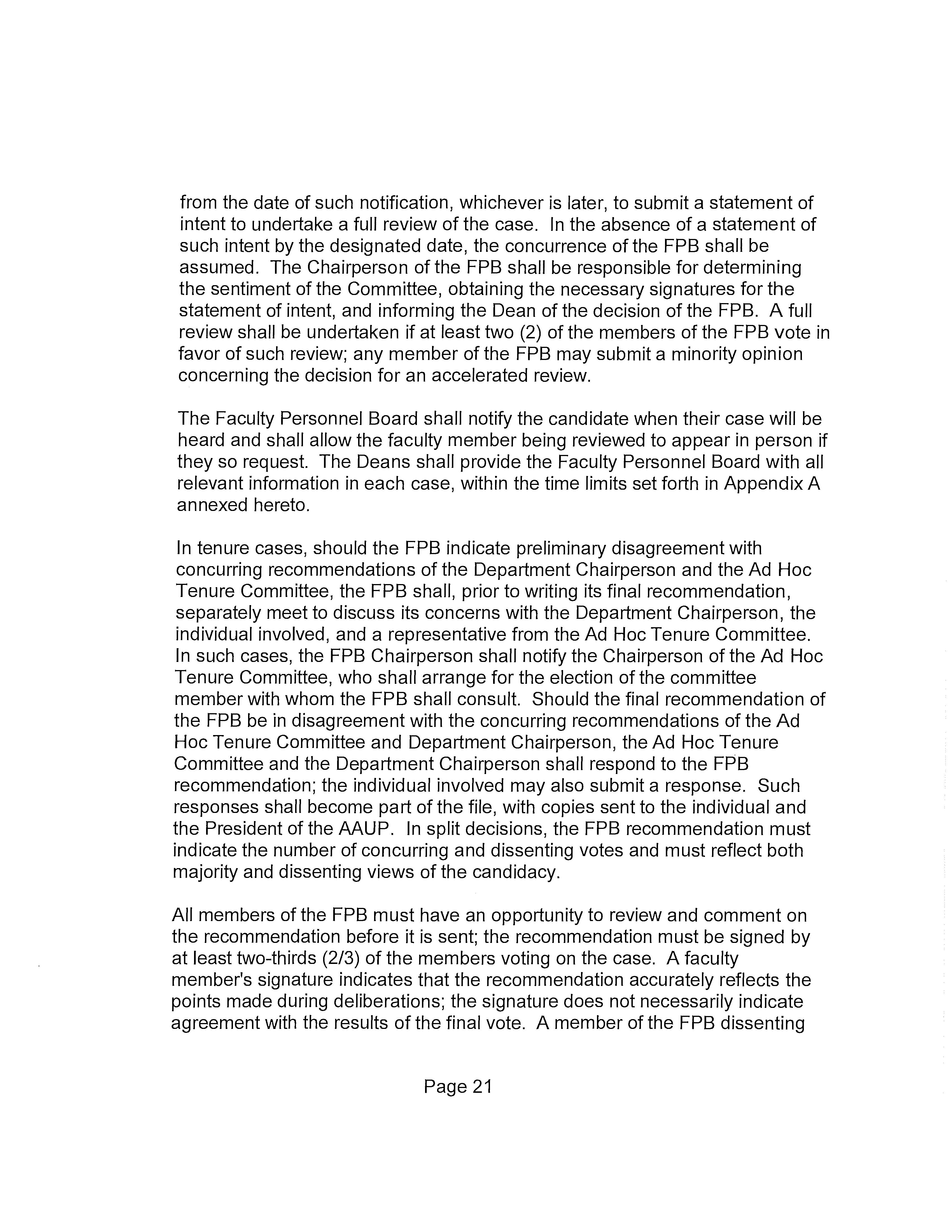
Page 21








